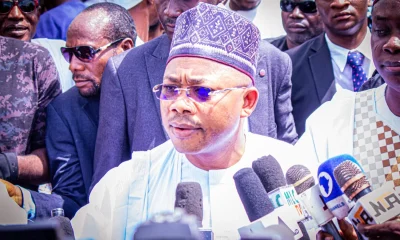NEWS
Expert Advocates IT, BVN Deployment to Fast-track Offer Verification

An economist, Mr Johnson Chukwu, has urged the Central Bank of Nigeria (CBN) to leverage existing infrastructure and Bank Verification Numbers (BVN) to address delays in verifying bank transactions.
Chukwu, the Chief Executive Officer of Cowry Asset Management Ltd.
, raised the concern at the annual workshop of the Capital Market Correspondents Association of Nigeria (CAMAN) in Lagos.The theme of the workshop is: “Banks’ Recapitalisation: Bridging the Gap Between Investors and Issuers in the Nigerian Capital Market”.
He noted that leverage existing infrastructure and BVN was to ensure speedy conclusion of the verification process.
According to him, the delay in the apex bank’s verification process, four months after the closure of some offers, has continued to raise concerns among investors.
Chukwu said the deployment of high level of IT available at the CBN and the use of the BVN would fastrack the process of accepting or rejecting the offers.
He added that this would enable investors get their allotment or deploy their funds in other profitable economic activities.
He noted that while the apex bank’s role in verifying the source of the capital invested was important, the longer period for completion of the verification process was dampening investor confidence.
Chukwu said that this was particularly worrisome for investors whose funds may be returned where the offers may be oversubscribed, as they would miss reinvestment opportunities.
He also stated that the current CBN requirements for investors investing in banks shares were seen by many as overly stringent and creating barriers for both issuers and investors.
Chukwu cited the provision of three-year audited financial statements, board resolution authoring the investment and tax clearance certificates for the past three years for corporate investors.
He noted that these requirements were disincentive to investment in the capital market.
According to him, while regulation is necessary for maintaining the stability and integrity of the financial system in ensuring that unqualified capital is not invested in the banks.
He added that there was need to leverage on existing customer information in the banking system to avoid imposing onerous conditions on investors.
Chukwu described banks’ recapitalisation as a key strategy for strengthening the Nigerian banking sector and fostering economic growth.
He, however, argued that the success of these efforts would hinges on effectively bridging the gap between investors and issuers in the capital market.
Chukwu said banks capital raise through successful IPOs, rights issues and bonds strengthens investor confidence and sends a positive signal to the broader financial market on the role of the capital market.
He said: “A well-capitalised bank is perceived as financially stable, reducing risk for investors and enhancing market confidence.
” This encourages further investment in the banking sector, which is essential for the sustainable growth of the industry.
He, however, called for concerted efforts from both banks and investors, supported by regulators in ensuring that the Nigerian banking sector remains resilient, competitive, and capable of driving the country’s economic growth for the future.
Chukwu also urged the CBN and other regulatory bodies to work together in creating a more predictable regulatory environment for banks and investors.
“The frequency of regulatory policy changes need to be moderated to allow for better planning for both banks and the investing public, as well as reduce the regulatory and operational risks associated with these frequent changes.
“Banks must commit to improving their transparency and disclosure standards. This includes the publication of detailed and accurate financial statements, risk disclosures, and forward-looking guidance,” he said.(NAN)
NEWS
Gov Adeleke, Osun PDP Caucus Endorses Tinubu’s Re-election Bid

From Ayinde Akintade, Osogbo
Governor Ademola Adeleke of Osun State and the leadership caucus of the the ruling Peoples Democratic Party (PDP) in the state have endorsed President Bola Tinubu’s second term bid.They assured of working for the success of the re-election bid of the President, who is the National Leader of the All Progressives Congress, (APC) in the country.
They made this known on Monday at the Osun State PDP Leadership Caucus meeting held at the Government House, Osogbo. Similarly, following extensive consultations, debates, surveys, opinion sampling from traditional rulers, community leaders, civil servants, retirees, religious leaders, market men and women, interactions with members of the PDP and the general public across major towns and villages in Osun State, on issues pertaining to recent political development in the state, the Leadership Caucus of Osun PDP hereby reviewed as follows: “That all politics is local, and as such, the feelings and aspirations of voters and party members are critical to decisions on party affiliations.”That the majority of the members of the APC in Osun State are opposed to the APC, which did not originate from the Governor in the first instance. Some APC leaders based on entrenched interests have demonstrated hostility and resentment towards Governor Ademola Adeleke. Some went on social media and national television to call Governor Adeleke all kinds of unprintable names.”That the majority of PDP members in Osun State are not happy about the idea of the defection of Governor Adeleke to wherever he goes to show their love, support and loyalty to his leadership.”That the state governor, the state government, and the PDP as a political party remain very popular and acceptable above all other political parties in Osun State.”Consequently, the leaders hereby resolve as follows:”That the PDP in Osun State recognizes the fact that Osun State is the ancestral home of President Bola Ahmed Tinubu, which makes the President the son of Osun State. “Therefore, the PDP in Osun State hereby, adopts, and endorses President Bola Ahmed Tinubu for re-election in the 2027 Presidential election.”That PDP in Osun State re-affirm it’s adoption and endorsement of Governor Ademola Adeleke for re-election in the 2026 Governorship election on the platform of the PDP.”That Governor Ademola Adeleke and all members of the PDP in Osun State should remain in the PDP.”That the leadership of the PDP in Osun State is directed to disseminate the resolution to all structures of the party in the state and that, the state governor is enjoined to forge ahead with governance and implementation of the administration’s five point agenda.”NEWS
Kogi Promises to Reposition Basic Education System

From Joseph Amedu, Lokoja
The Kogi state government has promised to reposition its basic education system as part of its desire to enhance effective learning and providing solid foundation for Children’s education.The state’s Commissioner for Education, Wemi Jones gave the assurance during the 2025 matriculation ceremony of new students at the Kogi State study Centre of the National Teachers Institute (NTI) in Lokoja.
The Commissioner also restated government’s commitment to supporting initiatives aimed at providing quality education at all levels of learning. Jones emphasised the importance of teacher training, noting that the future of children lies in the hands of teachers.Represented by the ministry’s Acting Permanent Secretary, Omolayo Berikisu Onozare, Jones appealed to the matriculating students to remain committed to their academics.He highlighted Gov. Ahmed Ododo’s significant budgetary allocation to the education sector, stressing that the training of teachers cannot be compromised under any guise.The Director General and Chief Executive of NTI, Professor Sadiya Daura, said the institute’s programmes were designed to equip students with necessary skills for national growth and development.Represented by the Kogi State Coordinator of NTI, Alh Tijani Yusuf, Daura warned students against indiscipline, emphasising the institute’s zero-tolerance policy towards misconduct.She urged them to strive for impact in their lifetime after training.On his part, the Director News and Publications, Kogi State Ministry of Information and Communications, Dr Samuel Atuluku, expressed concern about the “get rich quick syndrome” among young people.Atuluku appealed to parents to ensure proper discipline of their children and wards to change the narrative and secure a greater future for them.The highlight of the ceremony was the administration of the matriculation oath to new students enrolled in NCE, Bachelor Degree, and Postgraduate Degree programs in Education.The event marked a significant milestone for the students, who are expected to benefit from the institute’s programs designed to equip them with necessary skills for national growth and development.NEWS
C’River, NIGCOMSAT Train 200 Youths on VSAT

By Ene Asuquo, Calabar
The Cross River State Government and the Nigerian Communication Satellite Ltd (NIGCOMSAT) through collaboration is training about 200 youths drawn across the 18 local government areas of the StateIn his remarks at the training workshop in ASUU building, University of Calabar, the Cross River State Governor, Prince Bassey Edet Otu who was represented by the Honourable Commissioner for Science, technology and Innovation Dr.
Justin Beshel, emphasized that the training of these youths on VSAT technology will advance technological development and create employment for the 200 youthsHe stressed that Cross River is shifting from being the civil service State to a digitally incline State, taking advantage in the demands in the global Space of technology, stating that the 200 youths were drawn from the 18 local government areas of the state through online registrationAccording to Beshel, “These youths are meant to be trained on Very Small Aperture Terminal(VSAT) and also in space technology”. He stressed further that there is a high demand of labour in this sector and the state is trying to catch- in to create the man power that is needed internationally, maintaining that partnering with NIGCOMSAT, “the youths are brought to be empowered through innovation in satellite technologyIn her opening address, the Managing Director, NIGCOMSAT, Jane Egerton- Idehen who spoke in the event through the programme Coordinator, Maureen Neekwe said the program in cross river is a groundbreaking initiative aimed at equipping young minds with cutting – edge knowledge in satellite technology and digital communicationShe emphasized that the program is designed to foster innovation, enhance technical skills, while creating opportunities for youths in the ever- evolving space – tech industryNeekwe maintained that participants in the workshop will gain practical experience in setting up and configuring VSAT systems.















